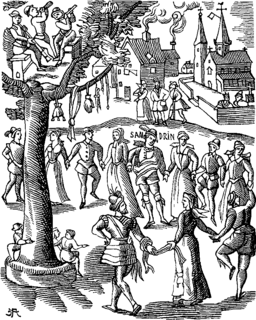
Yukon is the smallest and westernmost of Canada's three federal territories. It has the smallest population of any province or territory in Canada, with 35,874 people. Whitehorse is the territorial capital and Yukon's only city.

Yukon is a city in Canadian County, Oklahoma, United States. It is part of the Oklahoma City Metropolitan Area. The population was 22,709 at the 2010 census. Founded in the 1890s, the town was named in reference to a gold rush in Yukon Territory, Canada, at the time. Historically, Yukon served as an urban center for area farmers and the site of a large milling operation. It is now considered primarily a bedroom community for people who work in Oklahoma City.
Tutchone is a Athabaskan language spoken by the Northern and Southern Tutchone First Nations in central and southern regions of Yukon Territory, Canada. Tutchone belongs to the Northern Athabaskan linguistic subfamily and has two primary varieties, Southern and Northern. Although they are sometimes considered separate languages, Northern and Southern Tutchone speakers are generally able to understand each other in conversation, albeit with moderate difficulty.
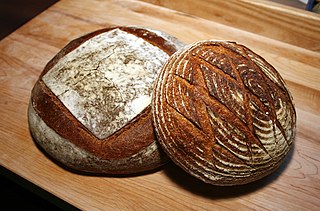
Sourdough bread is made by the fermentation of dough using naturally occurring lactobacilli and yeast. Sourdough bread has a mildly sour taste not present in most breads made with baker's yeast, and better inherent keeping qualities than other breads due to the lactic acid produced by the lactobacilli.
Rendezvous or rendez-vous refers to a planned meeting between two or more parties at a specific time and place. The term may also refer to:
"The Cremation of Sam McGee" is among the most famous of Robert W. Service's (1874–1958) poems. It was published in 1907 in Songs of a Sourdough. It concerns the cremation of a prospector who freezes to death near Lake Laberge,, Yukon, Canada, as told by the man who cremates him.
With the Klondike Gold Rush, a number of folk songs from Yukon became popular, including "Rush to the Klondike", "The Klondike Gold Rush", "I've Got the Klondike Fever" (1898) and "La Chanson du Klondyke".
Boudin Bakery is a bakery based in San Francisco, California, known for its sourdough bread. It was established in 1849 by Isidore Boudin, son of a family of master bakers from Burgundy, France, by blending the sourdough prevalent among miners in the Gold Rush with French techniques.

Sourdough Sam is a mascot for the NFL's San Francisco 49ers.
Carlin "Buckwheat" Donahue is an Alaskan folklorist, storyteller, entertainer, historian, adventurer, and three-time gold-panning champion, and has been involved in many different aspects of life in Alaska's Inside Passage.
Rēwena parāoa is a traditional Māori sourdough potato bread.
"The Shooting of Dan McGrew" is a narrative poem by Robert W. Service, first published in The Songs of a Sourdough in 1907 in Canada.
The Western Canadian Music Awards (WCMAs) are an annual awards event for music in the western portion of Canada. The awards are provided by the Western Canada Music Alliance, which consists of six member music industry organizations from British Columbia, Alberta, Saskatchewan, Manitoba, Yukon, and The Northwest Territories. The Western Canadian Music Awards presentation gala takes place on the final evening of the Breakout West music conference & festival, which takes place in a different Western Canadian city each year.
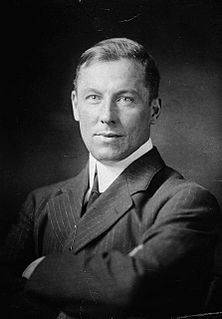
Robert William Service was a British-Canadian poet and writer who has often been called "the Bard of the Yukon". He is best known for his poems "The Shooting of Dan McGrew" and "The Cremation of Sam McGee", from his first book, Songs of a Sourdough. His vivid descriptions of the Yukon and its people made it seem that he was a veteran of the Klondike Gold Rush, instead of the late-arriving bank clerk he was. Although his work remains popular, Service's poems were initially received as being crudely comical works, but he became a wealthy author and lived very comfortably on proceeds from his writing.
Songs of a Sourdough is a book of poetry published in 1907 by Robert W. Service. In the United States, the book was published under the title The Spell of the Yukon and Other Verses.
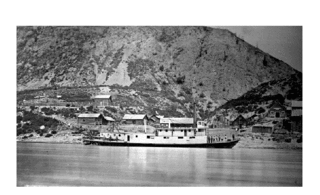
Steamboats operated on the Stikine River in response to gold finds in along that river and in the Cassiar Country of northwestern British Columbia, Canada.
The Klondike Gold Rush is commemorated through film, literature, historical parks etc.
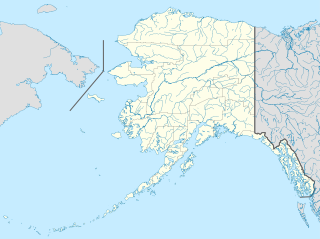
The Sourdough Inn, at First and Sled Streets in Fort Yukon, Alaska, was built in 1926, by moving a disused Army building from Fort Egbert near Eagle, Alaska. It was then modified and opened as a hotel. It has also been known as the New Sourdough Hotel and has served as a restaurant and as a hotel and as a post office and, briefly in the 1940s, as a school.

The Law of the Yukon is a 1920 American silent drama film inspired by the poem, The Law of The Yukon, by Robert W. Service. The film was directed by Charles Miller, and stars June Elvidge and Edward Earle. Portions of the movie were filmed at the Artic City studio in Port Henry, New York.

